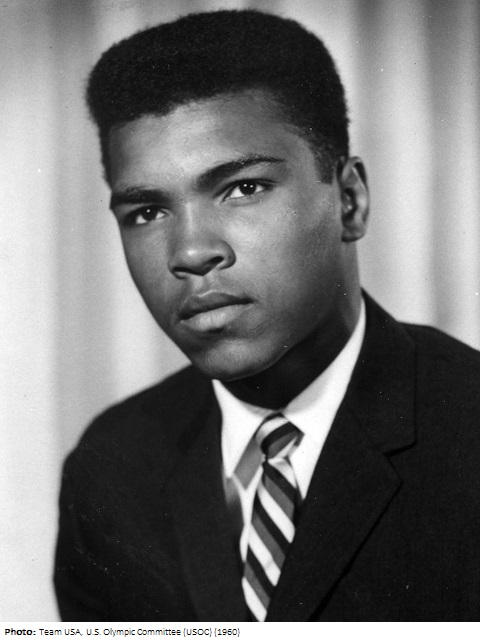
| Roles | Competed in Olympic Games • Torch Bearer • Olympic Flagbearer |
|---|---|
| Sex | Male |
| Full name | Cassius Marcellus•Clay, Jr. |
| Used name | Cassius•Clay |
| Nick/petnames | The Greatest |
| Other names | Muhammad Ali |
| Born | 17 January 1942 in Louisville, Kentucky (USA) |
| Died | 3 June 2016 (aged 74 years 4 months 17 days) in Scottsdale, Arizona (USA) |
| Measurements | 187 cm / 80 kg |
| Affiliations | Kentucky AAU, Louisville (USA) |
| NOC |  United States United States |
| Medals | OG |
| Gold | 1 |
| Silver | 0 |
| Bronze | 0 |
| Total | 1 |
He was born Cassius Marcellus Clay, the son of Odesa and Marcellus Clay but he would not keep the name. He preferred instead a name which dignified the black man, and he wore it well as the most famous athlete of his time. His story began as a reed-thin middleweight when he won the 1959 Golden Gloves championship. He repeated that victory in 1960, adding to it the AAU title and the Olympic light-heavyweight crown. Thus was born the saga of “The Greatest.” Clay turned pro right after the Rome Olympics and fought his first fight against Tunney Hunsaker. He won easily and continued to win as he worked his way up the heavyweight ranks. He punctuated his pugilistic abilities by composing doggerel verse to predict the outcome of his fights – “Float like a butterfly, sting like a bee, his hands can’t hit, what his eyes can’t see.”
Clay was the fastest heavyweight anybody had ever seen but few gave him a chance against “the Big Bear,” Sonny Liston, when they met for the heavyweight title on 25 February 1964. But Clay disarmed the menacing Liston, winning by a TKO in seven, and afterwards told the world he had embraced the Black Muslim faith and taken the name Muhammad Ali. The Muhammad Ali of the late 60s was an awesome fighting machine. With great speed, deceptive power, and an unequaled ability to take a punch, he was never beaten, never even seriously challenged. But the courts took away the title that other boxers could not. He refused induction into the U.S. Army claiming a conscientious objection because of his faith, so he was stripped of his titles and a conviction was sought.
The attempted conviction was overturned. Ali was vindicated and allowed to fight again but he had lost three years of his prime. He made a comeback, losing to then undefeated champion and 1964 Olympic heavyweight gold medalist, Joe Frazier, in a 15-round decision. However, Ali would later win back the heavyweight title by defeating George Foreman, another Olympic champion. He would eventually lose the title again, and then regain it against 1976 Olympian Leon Spinks. But he was never the same fighter after his three-year exile. He fought twice more against Frazier, winning both fights in epic struggles, including the Thrilla in Manila, often considered the greatest heavyweight bout of all-time.
In the late 70s, Ali attempted to regain the title again, but he was overweight and out of shape. A mere caricature of the once great fighter, he was punished by heavyweight champion Larry Holmes. Ali finally was convinced to retire but not before he had made his mark on the world of sport – as The Greatest. Ali’s career professional record was 56 wins, 37 by knockout, and 5 losses. Later in life, he developed post-traumatic Parkinsonism, causing him to walk and speak very slowly. In 1996 at Atlanta, he was honored, and honored us all, by lighting the Olympic Flame at the Opening Ceremony. He was simply The Greatest.
| Games | Discipline (Sport) / Event | NOC / Team | Pos | Medal | As | |
|---|---|---|---|---|---|---|
| 1960 Summer Olympics | Boxing |  USA USA |
Cassius Clay | |||
| Light-Heavyweight, Men (Olympic) | 1 | Gold |
| Games | Role | NOC | As | |
|---|---|---|---|---|
| 1996 Summer Olympics | Torchbearer at the Opening Ceremony (Lit flame) |  USA USA |
Cassius Clay | |
| 2012 Summer Olympics | Olympic flagbearer at the Opening Ceremony |  USA USA |
Cassius Clay |